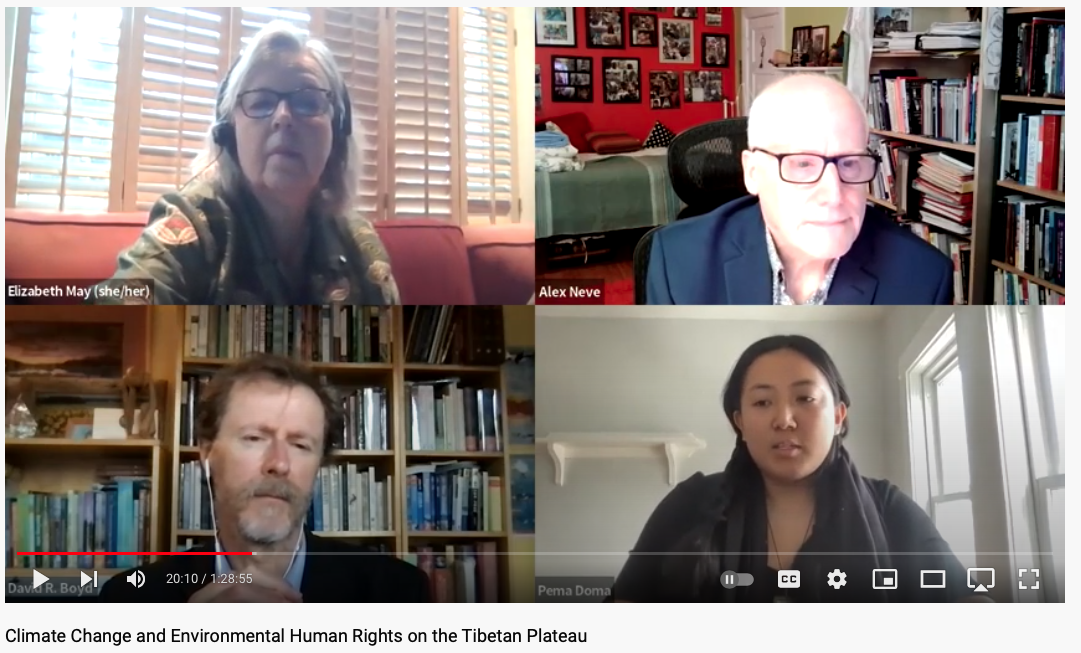Ottawa, February 9, 2022 – On the 40th anniversary of the University of Ottawa’s Human Rights Research and Education Centre (HRREC), the Canada Tibet Committee partnered with the HRREC to host a webinar on climate change and environmental human rights on the Tibetan plateau.
The event was designed to discuss the intersection of climate change, human rights, and Tibet, with the representations of perspectives from the UN, Canada, and Tibet: the UN Special Rapporteur on Human Rights and the Environment Dr. David R. Boyd, parliamentary leader of the Green Party of Canada MP Elizabeth May, and Tibetan climate activist and campaign director of Students for a Free Tibet Pema Doma. Alex Neve – a Canadian human rights activist and former Secretary-general of Amnesty International Canada, moderated the event.
The audience attending the event included academics, government and parliamentary officials, media, climate activists and researchers, and many more.
Speaking on how the human rights of the Tibetan people are disrupted by climate change and by the Chinese government policies and practices, Tibetan climate activist Pema highlighted the struggles and significance of Tibetan nomads, “What we do know for a fact is that not only in Tibet but everywhere in the world that indigenous communities and pastoralism are both things that have really increased climate sustainability,” said Pema “You know indigenous communities make up 5% of the world’s population, but they protect over 80% of biodiversity in the world, and we know that biodiversity creates resilient communities that are more resilient to climate change. But inside Tibet now, we see both of these things being criminalized.”
Speaking on the intersection of climate change and human rights, the UN Special Rapporteur on Human Rights and Environment Dr. David R. Boyd mentioned, “I think this is a critically important conversation because as everybody knows we are in embroiled in the midst of this multiple interlocking environmental crisis around the world which is not only the climate crisis but also the collapse of biological diversity, the pervasive pollution of the planet, the surge in emerging infectious diseases, shortages of water and so on. So it’s a horrifying catalog of environmental crisis and these crises, we have attempted to fight. It pains me to say this, but we have attempted to deal with this environmental crisis…”. Adding to this, David, who is an environmental lawyer and internationally renowned expert on human rights and the environment, said, “it is critical that we talk about a human rights-based approach to all aspects of climate crisis whether we are talking mitigation, adaptation or loss and damages.”
MP Elizabeth May, who has been a supporter of the Canada Tibet Committee for more than a decade, spoke on the significance of the Tibetan plateau and how the issue of Tibet remains primarily ignored when discussing climate change and environmental human rights. “Tibet is not just an environmental issue. It is a human rights issue. It’s also a geopolitical security issue; you start losing the major rivers of Asia watersheds where half the world population lives. It’s desperately dangerous. So the geopolitical issue here is can we align the rights of Tibetan people, can we, and certainly the People’s Republic of China and its government is an essential part of a solution to the climate crisis,” said MP May. “What I believe motivates a lot of the people who are in leadership of the PRC is they do not deny climate change. They are looking at a significant security threat. And they engage in meaningful ways and global climate negotiations. But there’s always this huge, I mean, it’s not just the elephant in the room. It’s an elephant bigger than the room is a human rights abuses and the oppression and, and occupation of Tibet, the suppression of human rights – they all aligned around a solution, which is how do we engage the government People’s Republic of China.”
Answering a question on why the issue of Tibet should concern Canadians, MP May responded, “I know it’s hard just to find the justification for why it does, but I know it does. I think part of it is in the message of peace and unbelievable patience, and compassion that His Holiness the Dalai Lama personifies. The message one, whenever His holiness comes to Canada, there isn’t a rock bank that needs a bigger stadium, than His Holiness the Dalai Lama. People are desperate, like the materialistic secular consumer society that we live in that doesn’t see us as citizens but sees us as consumers were in a deep spiritual crisis. And the message of His Holiness the Dalai Lama transcends politics, it actually raises people up…. I think overwhelmingly Canadians want to see that Tibetan human rights are respected..”
Watch the full video here:
By Sherap Therchin, executive director, Canada Tibet Committee

